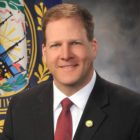Distant Dome is co-published by Manchester Ink Link and InDepthNH.org
By GARRY RAYNO, Distant Dome
These are the days in the legislature where the rubber meets the road.
With less than a month to go in the 2018 session, lawmakers face some of the biggest decisions they will make this term.

Garry Rayno
The House and Senate have each scheduled two sessions this week to address the remaining bills on their dockets.
This week will not be the final vote on many of the bills, that will come May 24 when the House and Senate are scheduled to vote on conference committee reports containing compromises reached on different versions of bills.
Lawmakers usually find a way to reach agreement on key bills but not always and an election year increases political posturing.
Medicaid Expansion
In past sessions, Senate Bill 313 or reauthorizing the Medicaid expansion program under the Affordable Care Act providing health insurance to low-income adults would have been a nail bitter, particularly in the House.
But this session, the bill comes to House floor with a 24-2 approval recommendation from the Finance Committee.
The bill makes some significant changes in the program that has generated more than $1 billion for the state’s heath-care providers over the past four years and covered the health-care costs for more than 50,000 mostly working poor.
The changes include work or community service requirements, something approved two years go but not allowed under the previous administration in Washington as well as penalties for using emergency rooms for routine medical services.
The Trump administration has opened the program to greater restrictions and the legislature has taken advantage.

YouTube
President Donald Trump
Just as important, however, is the change from a private insurance, fee-for-service model to the traditional managed care system currently administered by two managed care organizations.
Using private health insurers did several things, allowed the state to shift the risk to the private sector and increased what hospitals receive for the services they provide under Medicaid.
Shifting the risk drove up prices for everyone using the individual market and reduced uncompensated care for providers mainly hospitals, but also community mental and physical health centers.
The change should ultimately reduce premium increases in the private insurance exchanges, but increase uncompensated care for providers because of the notoriously low reimbursement rates the state pays under Medicaid.
The higher costs to providers comes at a time when they are fighting the state over determining uncompensated care costs and the state’s share.
That issue remains to be resolved in the courts and negotiations here between the hospitals and the state recently broke down.

Rep. David Danielson
The House Finance Committee also made other changes in the bill including revising the five-year reauthorization, making it a two-and-a-half year program that would automatically renew “unless the (oversight) commission determines it should end or the federal government block grants Medicaid to the state,” according Rep. David Danielson, R-Bedford, finance committee member.
The committee changes include establishing a medical loss ratio to limit administrative costs for the program and linking Medicaid expansion and a new workforce development program established using excess federal welfare funds for the state.
The changes are enough to most likely cause the Senate to negotiate on a final version of the program with the House.
However, none of this is likely to derail the reauthorization many lawmakers from both sides of the aisle call critical to the state’s fight against the opioid epidemic that claimed thousands of lives.

Gov. Chris Sununu, R-NH
Gov. Chris Sununu, who voted against the first Medicaid expansion contract when he was an executive councilor, currently supports reauthorizing the program.
While Medicaid Expansion has won support over the years, the House is still not willing to touch anything that resembles universal health care.
The Senate approved Senate Bill 383, which establishes a commission to recommend policies to enhance access to affordable health care, but the House Commerce and Consumer Affairs Committee voted 11-7 to recommend the bill be killed.
The original bill would have studied a universal health care system but the senate changed it to enhancing access.
Vouchers
Perhaps the biggest fight next week will be over a bill allowing parents to use state adequate education money to help pay tuition to private schools or for home education efforts.
Senate Bill 193 would give low- to medium-income parents most of the state grant per student while giving the school district losing the student a one-time grant about half of what it would have received.

Wikipedia
Secretary of Education Betsy DeVos
The controversial bill has been vigorously supported and opposed and is a model being pushed by national groups including the secretary of the federal Department of Education Betsy DeVos and Sununu.
Votes on the bill have largely fallen along party lines with Republicans supporting it and Democrats opposed.
The Senate approved the bill last year but the House Education Committee believed it needed more work and retained it until this session.
Earlier this year, an amended bill that removed religious schools from the program, passed the House on a 184-162.
The bill went to the House Finance Committee for review and members have been working on it since early January without finding a consensus.
Finance chairman Rep. Neal Kurk, R-Weare, has continued to have concerns saying the bill downshifts costs to school districts in ways that cannot be addressed by budget reductions at the local level.
Schools losing a few students does not mean teaching positions can be reduced and schools losing a large number of students as is expected in the state’s larger cities where there are more options, could see significant reductions in state aid because of the school funding formula providing additional money for students on free or reduced lunch plans, in special education and English as a second language programs.
Other concerns raised by a majority of the Finance Committee is the lack of special education programs in private schools, and accountability issues with private schools and home schooling programs.
But supporters say it will provide opportunities for every child to find the right education that best serves his or her needs while limiting the financial damage to public schools.
School districts have opposed the bill while those seeking alternative education settings have supported it and both sides have made their case to House members and continue to do so.
This is one to watch this week.
Transgender Protections
Almost as controversial is House Bill 1319, which prohibits discrimination based on gender identity by adding transgender residents to the law prohibiting discrimination in employment, housing, and public spaces.
This issue has been before lawmakers several times before without success, but supporters believed they had made their case this session packing public hearings and doing the hard grass roots work needed to convince representatives.
That worked in the House and the bill passed by a healthy 195-129 margin.
Last week the Senate Judiciary Committee voted down party lines 3-2 to recommend the bill be sent to Interim Study killing it for this session.
Freedom New Hampshire, which is leading the effort to pass the anti-discrimination bill, wants Senate members to overturn the recommendation and pass the bill the House approved.
Linds Jakows, Freedom New Hampshire Campaign Manager, provided the following statement:
“HB 1319 is an urgent solution to a pressing problem and has been thoroughly vetted during over 12 hours of committee hearings this year alone. In fact, the New Hampshire House resoundingly passed HB 1319 with overwhelming bipartisan support,” said Linds Jakows, Freedom New Hampshire Campaign Manager. “We know that one five-person Senate committee does not speak for all New Hampshire legislators, let alone all Granite Staters who value individual liberty and opportunity for all.”
Religious groups and organizations such Cornerstone Action are working to defeat the bill which Sununu has said he would sign.
This is another bill that will be very interesting to watch this week.
Burgess Live On
The Burgess BioPower plant in Berlin would have a three-year window to continue operations once a cap on above-market charges to ratepayers is reached, expected in 2020.
Senate Bill 577 originally called for the Public Utilities Commission to reopen its order on the plant and to reassess the cap on the above-market rates, but the House’s version orders the PUC to allow three years of operations after the cap is reached.

YouTube
Former House Speaker William O’Brien
City and regional officials appealed to lawmakers last month saying if the plant shuts down it would have a devastating affect on the city, as well as the logging industry in the North County.
In return for suspending the cap for three years, the PUC would have access to the plant’s financial records although they would not be made public.
Continuing to have Eversource ratepayers subsidize the plant’s operation has been criticized by many including former House Speaker Bill O’Brien, but lawmakers are likely to continue the practice.
Garry Rayno can be reached at garry.rayno@yahoo.com
Distant Dome by veteran journalist Garry Rayno explores a broader perspective on the State House and state happenings. Over his three-decade career, Rayno covered the NH State House for the New Hampshire Union Leader and Foster’s Daily Democrat. During his career, his coverage spanned the news spectrum, from local planning, school and select boards, to national issues such as electric industry deregulation and Presidential primaries. Rayno lives with his wife Carolyn in New London.





